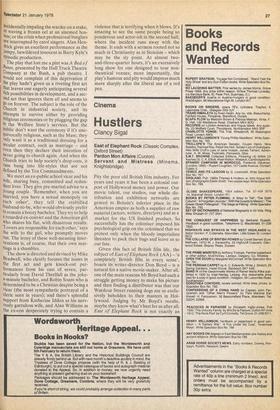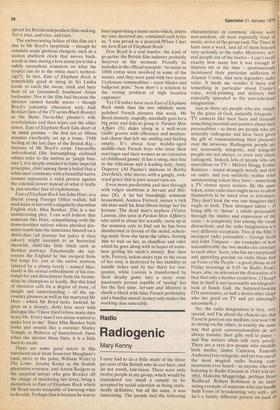Cinema
Hustlers
Clancy Sigal
Pity the poor old British film industry. For years and years it has been a colonial outpost of Hollywood money and power. Our movie talent, our studios, our whole distribution and exhibition networks are geared to Britain's inferior place in the American empire as both a supplier of raw material (actors, writers, directors) and as a market for the US finished product. So successfully has the coloniser imposed his psychological grip on the colonised that we protest only when the bloody imperialists threaten to pack their bags and leave us to our fate.
Given this fact of British film life, the subject of East of Elephant Rock (AA) — 'a completely British film in every sense', boasts its writer-director Don Boyd — is a natural for a native movie-maker. After all, one of the main reasons Mr Boyd had such a struggle getting money to make his picture and then finding a distributor was that our Wardour Street running dogs are so exclusively beholden to their masters in Hollywood. Judging by Mr Boyd's results, maybe they know what's best for us after all. East of Elephant Rock is not exactly an advert for British independent film-making. Yet it tries, and tries, and tries.
The embarrassing failure of this film isn't due to Mr Boyd's ineptitude though he commits some glorious dangers, such as a station platform clock that moves backwards in time during a love scene (or is this a subtly surrealistic comment on what the tropics can do to the white man's technology?). In fact, East of Elephant Rock is remarkably good at using its Sri Lanka locale to catch the sweat, stink and hazy heat of an (unnamed) Southeast Asian backwater. Nor is the film bad because the director cannot handle actors though Boyd's romantic obsession with Judi Bowker (late of the TV series Black Beauty) as the Bette Davis-,like planter's wife overbalances and then wipes out the other actors. East of Elephant Rock falls short of its initial promise the first ten or fifteen minutes excellently set up a tense, 1948 feeling of the last days of the British Raj because of Mr Boyd's script. Ostensibly anti-colonial (the harrumphing clubland whites refer to the natives as 'jungle bunnies'), it is deeply attached to basic imperial principles, chief among them a belief that a white man's intimacy with a beautiful native woman represents a valid protest against the colonial power instead of what it really is, just another face of exploitation.
East o fElephant Rock has John Hurt, as a liberal young Foreign Office wallah, fall mad-keen in lust with a singularly charmless English stick, Miss Bowker. This is a not uninteresting ploy. I can well believe that someone like Hurt, sympathising with the down-trodden natives whose physical presence repels him (he immolates himself on a third-class rail journey but pukes at their odour), might succumb to an hysterical shrewish, child-like little bitch such as Bowker portrays. Emotionally she represents the England he has escaped from but longs for, just as the native mistress (played by a plump lovely named Sharmani) is the sexual embodiment of his contempt for and detachment from the brownskins he champions so loudly. But this kind of situation calls for a degree of irony, of insight and understanding of the upcountry planters as well as the martyred Mr Hurt which Mr Boyd lacks. Instead, he gives us a droopy, dotty love story with dialogue like 'I have tried to love many men in my life. Every man I ran across wanted to make love to me'. Since Miss Bowker both looks and sounds like a sweatier Shirley Temple in Rebecca of Sunnybrook Farm when she intones these lines, it is a little hard to credit.
There are some good actors in this barefaced steal from Somerset Maugham's (and, more to the point, William Wyler's) The Letter. Jeremy Kemp as the brutish plantation overseer, and Anton Rodgers as the sceptical lawyer who gets Bowker off the charge of murdering her lover, bring a distinction to East of Elephant Rock which Mr Boyd seems incapable of knowing what to do with. Perhaps that is because he was so busy supervising a music score which, unless my ears deceived me, contained such lyrics as, 'I was proud as a peacock/When I met my love /East of Elephant Rock'.
Don Boyd is a real hustler, the kind of go-getter the British film industry probably deserves at the moment. Proudly he includes in the official synopsis: 'As many as 1000 extras were involved in some of the scenes, and they were paid with two scarce Ceylonese commodities razor blades and ballpoint pens.' Now there's a solution to the vexing problem of high location expenses!
Yet I'd rather have seen East of Elephant Rock made than the two infinitely more polished French pictures this week. Mr Boyd clumsily, stupidly, suicidally goes for a big prize and fails to grasp it. Pardon Mon Affaire (X) slides along in a well-worn Gallic groove with efficiency and mechanical charm that left me smiling and feeling empty. It's about four middle-aged middle-class French boys who treat their marriages and their women as an extension of childhood games. It has a smug, nice line in the ridiculous and a leading lady, Anny Duperey (Al Pacino's mistress in Bobby Deerfield), who moves with a gangly, awkward grace that is pure sexual turn-on.
Even more predictable and shot through with vulgar snobbism is Servant and Mis tress (X). A fat but broodingly sensuous housemaid, Andrea Ferreol, nurses a rich old man until his final illness brings her his fortune. The dead man's nephew (Victor Lanoux, also seen in Pardon Mon Affaire), who used to abuse her sexually, turns up at the mansion only to find out he has been disinherited in favour of the stolid, scheming maid. Now she turns the tables, forcing him to wait on her, as chauffeur and valet. which he goes along with in hopes of some how getting his uncle's money. But class tells. Ferreol, below-stairs type to the roots of her soul, is destroyed by her inability to handle riches and by her thirst for ven geance, while Lanoux is transformed by their deadly game into a more com passionate person capable of 'seeing' her for the first time. Servant and Mistress is chock-a-block with false French profundity and a familiar moral: money only makes the working class miserable.



































 Previous page
Previous page